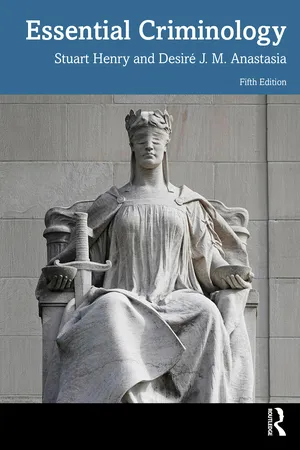
- 604 pages
- English
- ePUB (mobile friendly)
- Available on iOS & Android
Essential Criminology
About this book
This significantly expanded edition of Essential Criminology covers the broadest range of criminological theories—the essential criminological theories—from longstanding ones such as classical theory and strain theory to recently introduced ones such as ultra-realism and green cultural criminology. Whether all are "essential" depends on one's theoretical stance. The value of this text is its carefully designed comparative analysis, which helps readers consider their relative contribution to the field.
Originally designed as an alternative to lengthy and expensive introductory texts, Essential Criminology provides a concise, yet comprehensive overview of the field. The book offers a clear, structured, student-friendly, critical analytical examination of the nature of crime, theories of crime causation, and their criminal justice policy implications. Causal theories covered range from micro-level classical and rational choice to biological psychological, social learning, social control, and interactionist perspectives, to macro-level social ecology, anomie/strain, conflict, Marxist, feminist, and postmodernist theories. Over its 26-year history the book has added new theoretical perspectives as these have gained prominence. New to this edition are chapters on critical and ultra-realism, and critical green criminology and discussions of zemiology, critical race theory, and quantum holographic criminology. The authors have also expanded some theoretical frameworks that had previously been underdeveloped such as opportunity theory, subcultural theory, and social constructionism.
Essential Criminology contextualizes criminology in the globally interdependent 21st century, addressing the crimes of terrorism, global pandemics, and climate change. With its cutting-edge updates, illustrative real-world examples, and student-friendly study tools, including analytically comparable summary charts exposing each theory's ontological assumptions, this text was designed primarily for undergraduate criminology courses, but has also been adopted by community colleges and graduate programs in criminology, sociology, and political science.
Frequently asked questions
- Essential is ideal for learners and professionals who enjoy exploring a wide range of subjects. Access the Essential Library with 800,000+ trusted titles and best-sellers across business, personal growth, and the humanities. Includes unlimited reading time and Standard Read Aloud voice.
- Complete: Perfect for advanced learners and researchers needing full, unrestricted access. Unlock 1.4M+ books across hundreds of subjects, including academic and specialized titles. The Complete Plan also includes advanced features like Premium Read Aloud and Research Assistant.
Please note we cannot support devices running on iOS 13 and Android 7 or earlier. Learn more about using the app.
Information
Table of contents
- Cover
- Half-Title Page
- Endorsement
- Title Page
- Copyright Page
- Table of Contents
- List of Figures
- Preface to the 5th Edition
- Acknowledgments
- 1 What Is Crime? Defining the Problem
- 2 What Is Criminology?: The Study of Crime, Criminals, and Victims
- 3 Crime and Criminology in a Global Context?
- 4 Measuring Crime: How Criminologists Obtain Data on the Extent of Crime and Victimization
- 5 Classical, and Neoclassical Theories: Crime as Free Will—Myth or Reality?
- 6 Rational-Choice and Routine-Activities Theories: Crime as Opportunity
- 7 Biological, Physiological, and Biosocial Theories: “Born to Be Bad”
- 8 Psychoanalytical, Personality Traits, and Learning Explanations: Criminal Minds
- 9 Socio-Psychological and Cognitive Learning Theories: “Stinking Thinking”
- 10 Neutralization and Moral Disengagement Theories: “Everybody Does It”
- 11 Social Control, Social Bonding, and Self-Control Theories: “Poor Parenting”
- 12 Developmental and Life-Course Theories: Crime Over Time
- 13 Labeling and Social Constructionist Theories: Reaction to Social Control
- 14 Social Ecology and Social Disorganization Theories: Crimes of Place
- 15 Anomie and Strain Theories: The Sick Society
- 16 Subcultural Theories and Cultural Criminology: Cultures of Crime
- 17 Conflict and Radical Criminology: Capitalism as a Criminogenic
- 18 Critical Criminology: Power and Difference in Postmodern Society
- 19 Feminist Criminology: Patriarchy, Gender, and Crime
- 20 Critical Realist and Critical Green Criminology: Grounding Critical Criminology
- 21 Integrated Criminology: Toward a Unified Criminology
- References
- Index